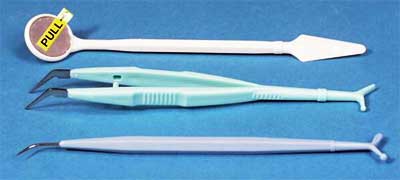
The Check Up
Regular dental check ups are the best way to make sure your gums and teeth stay healthy. The check up allows your dentist to diagnose any problems, and to take preventive action to stop problems before they develop.
Your dentist is trained to look for anything unusual in your mouth, throat and neck, including the oral manifestations of diseases, oral cancer, infections, the early signs of gum disease, eroded fillings and dental decay.
Your dentist understands the treatment alternatives available to you, and can help you make informed decisions about your dental care. But you have a role to play too in preventing many of the common dental problems associated with growing older.
Brush and floss your teeth properly, visit your dentist regularly for a professional cleaning, check up and necessary treatment, and update your dentist on your medical history, including any new medication you are taking
Ten oral health problems your dentist can see that you can't:
1. Deterioration in fillings, crowns and other restorations.
2. Root cavities — decay on roots of teeth exposed by receding gums.
3. Periodontal pockets caused by gum disease.
4. New decay under the gumline.
5. Cavities under existing fillings.
6. Hairline tooth fractures.
7. Impacted wisdom teeth.
8. Early signs of gum disease.
9. Early signs of oral cancer.
10. Signs of other problems that could affect your general health
Parts of the Check Up
During your check up, your dentist will look for early signs of oral cancer and many other diseases. Your dentist will also look for gum disease, cavities, eroded fillings, tooth fractures, and oral infections. He or she is trained to catch small problems before they become big ones, and can often treat a problem right away.
A check up can include some or all of the following procedures:
1. Dental and medical history update
- Your dentist will ask you about any oral or general health problems you have (e.g. changes in your teeth, sensitive gums, allergies, medical conditions)
2. Examination and treatment
- Your dentist looks for anything unusual and catches small problems before they become big ones (e.g. early signs of gum disease, eroded fillings, infections, oral cancer). Many small problems can be caught before they get big and can often be treated right away.
3. Cleaning
- A cleaning makes your teeth and fillings smooth, so it's harder for plaque to build up on your teeth. Plaque is clear and sticky. It forms on your teeth every day. If plaque is left on your teeth, it hardens into tartar (also called calculus). A cleaning is the only way to remove tartar. It cannot be removed with your toothbrush. If tartar is not removed, it can help cause gum disease. A cleaning also removes some stains, so your teeth look better.
Here are the main steps in a cleaning. Your dentist may do these steps in a different order, because your teeth are unique.
· Flossing removes plaque from under the gumline and between teeth. It also removes bits of food from between teeth.
· Scaling removes tartar from teeth. "Gross scaling" removes bigger pieces of tartar. "Fine scaling" gets much smaller pieces of tartar, mostly from back teeth and other hard-to-reach places.
· Polishing smooths and cleans the surfaces of the teeth.
Why do I need my teeth cleaned?
Professional cleaning is the only way to remove hardened deposits of tartar from your teeth. If tartar is not removed, it can cause gum disease, the leading cause of tooth loss in adults.
Cleaning also smoothes and polishes the surfaces of your teeth and your fillings so they are less likely to accumulate plaque (the invisible bacterial film that builds up on teeth every day). Finally, cleaning removes stains and mild discolourations, so your teeth look better.
A good cleaning can take some time, but it's time well spent. A cleaning by your dentist or dental hygienist helps to prevent gum disease, one of the most common adult dental problems.
4. Fluoride treatment
- A member of your dental team may apply fluoride to your teeth during a check up. It may be a gel, a foam or a liquid. Fluoride helps prevent cavities by fixing the first, tiny stages of tooth decay, and by slowing down the germs (or bacteria) growing on your teeth. Your dentist will talk to you about your total exposure to fluoride to determine if you need a fluoride treatment.
5. Advice
- Your dentist can give advice and answer your questions based on the results of your checkup.
You can help your dentist understand more about your teeth by telling your dentist about any changes in your mouth or with your overall health. Ask your dentist questions about your check up results and how to take better care of your teeth and gums. And make sure your dentist has your updated medical history.
